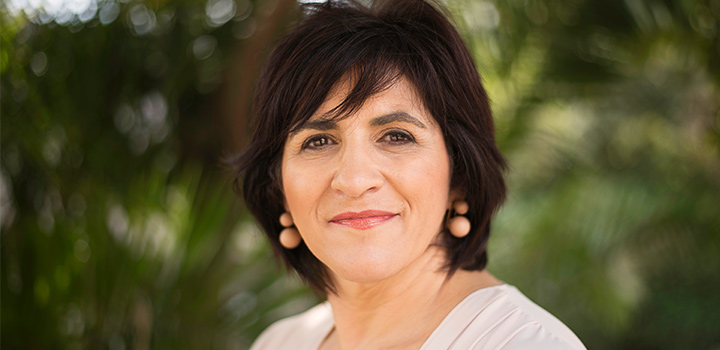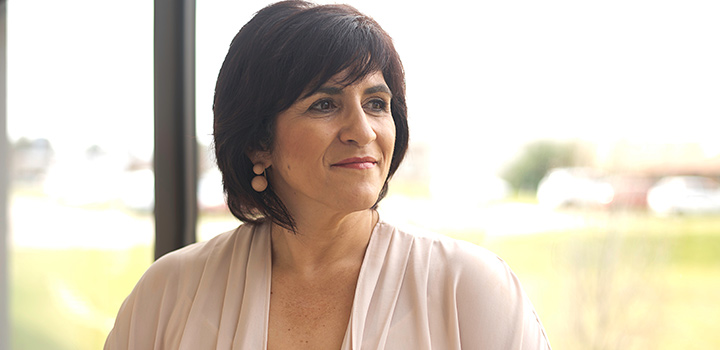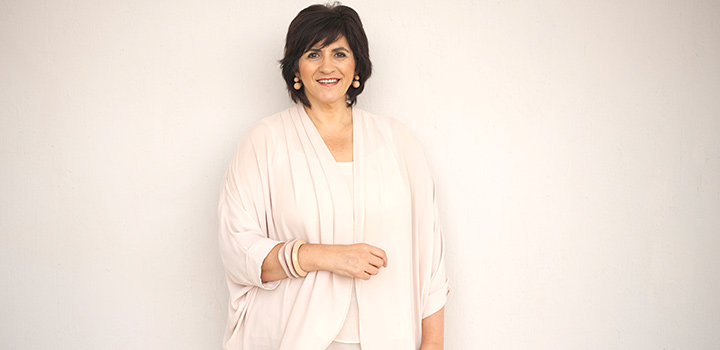How Sherene Grobler survived ovarian and breast cancer

Sherene Grobler, a 56-year-old grandmother of four, is a cancer survivor. Diagnosed with ovarian cancer in 2017 and stage 2 breast cancer in 2019, she is now in remission and goes for regular check-ups in a proactive approach to optimising her health. Sherene shares her story in her own words.
I'd had a spastic colon for a while, so when I started getting stomach pains in August 2016, I simply put it down to that. I tried to control it by cutting out carbohydrates and sugar, but it slowly got worse. Towards the end of January 2017, I decided to see a gastroenterologist, who skipped the colonoscopy and sent me straight for a CT scan.
When I think how differently things could have turned out, I am so grateful for the life I have and for my nine-month-old grandson - the newest addition to the family. My heart just wants to explode with joy at being alive each day. Looking back on the past five years, I really feel I have learnt so much from my experience with cancer. These are six important lessons I want to share with others:
- There are many reasons why cancers develop. However, what is important is to know that a cancer diagnosis does not in any way spell an end. It's a chance to explore the options and, for some, it can be a new chapter in life.
- Early detection is crucial so please make sure you go for regular screening and health checks, especially if you are at high risk of developing cancers (for example, if it runs in your family). I do believe that we know our bodies best and should not ignore worrying signs.
- Read more on women's cancer screening and preventive tests - When dealing with cancer, having a great support system is important. Keep in mind that cancer can be very overwhelming and frightening for some people, so choose who you confide in and rely on carefully.
- For me, faith is central to getting me through and I would recommend centring yourself in your belief system. I thank God for my health and for saving my life and guiding me to the right medical care at all times. The fact that I am alive is a miracle I reflect on every day.
- Positive thinking is key to dealing with a cancer diagnosis as well as possible. Become aware of your mindset and know that we can change the way we think and be in control of our thoughts, with significant impact on our day-to-day experience, our lived reality, and our cancer journey.
- Take note of how you are living. We can make healthier choices to live less stressful lives, eat more healthily, exercise and sleep better. We can choose to change and focus our minds and lives on what is really important. If anything, the COVID-19 pandemic has shown us that it is possible to slow down and regroup.
"They noticed a very large tumour attached to my ovaries"
I'd had a spastic colon for a while, so when I started getting stomach pains in August 2016, I simply put it down to that. I tried to control it by cutting out carbohydrates and sugar, but it slowly got worse. Towards the end of January 2017, I decided to see a gastroenterologist, who skipped the colonoscopy and sent me straight for a CT scan.
They picked up a very large tumour attached to my ovaries. My gynaecologist later said a colonoscopy would have probably missed it entirely. They said it needed to come out. I was quite calm in that situation, but it did hit me afterwards.
An hour-long operation was scheduled for 2 February 2017. However, in theatre, they found another tumour, partly on my urethra and a bit of it on my bladder. They called in the urologist to assist them and all of it was either cut or scraped away in what turned out to be a three-hour operation. My gynaecologist was confident they'd got it all.
Diagnosis: Stage 2A Ovarian cancer
A week later I received the biopsy results. It was stage 2A ovarian cancer. My gynae said I must still have chemotherapy to make sure no cancer remained. At first, I saw an oncologist at the Netcare Unitas Hospital in Pretoria who advised me that it would be more convenient for me to have my chemotherapy closer to home. I decided to see the oncologist from the Life Wilgers Hospital who also has rooms in Witbank, close to my home.
I was all braced for the initially recommended 18 weekly sessions of chemotherapy, but after speaking to the gynae about the operation, his receptionist called to say I only needed to go once every three weeks. The oncologist from Wilgers also confirmed that I only need to do six chemotherapy treatments, one every three weeks. The operation to install a port, for what would have been far more frequent chemotherapy, was cancelled. I was also given the option to start a week later to celebrate my birthday on March 3rd, also giving my surgical wound an extra week to heal.
- Find out more about ovarian cancer: What should you know?

"Our prayers were answered."
Five days after my birthday, I got more good news - just as the chemotherapy was due to start. I'd only need one of the two chemotherapy drugs initially recommended, which meant I wouldn't lose my hair. I never needed radiation. It got even better. After my second chemotherapy session, they said it might be possible to do only four sessions. My family, friends and I started praying that it would be only four, and our prayers were answered. On 17 May 2017, I had my last chemotherapy session.
I'm not saying it wasn't hard and that I wasn't nauseated or sick, but it's also all been a huge spiritual journey. When you're sick, your defences are down and there were times when I was more emotional. A dear lady helped me refine my spiritual life.
"Using positive affirmative prayer made all the difference"
She said that if I put God foremost in my mind, my negative self-talk would back off, as would the disease. It was hard, but I directed my mind and quoted scriptures to myself. Using positive affirmative prayer made all the difference. For example, right at the beginning when the gynae told me the biopsy from the surgery was positive, I remember thinking, I don't have cancer. My tumours had cancer, not me, and they removed them all in the surgery. So, I decided we'd tell everybody the absolute truth.
One of my daughters has a mother-in-law with a farm just 15 minutes outside Witbank and she invited me to recover there. I could just be. They had no idea what my side-effects would be. If I was nauseated and didn't want to eat, she'd bring me fruit. I never actually threw up. My church group prayed constantly for me and my friendship group gave me a huge gift pack with all sorts of things, like funny cards saying, 'I've got chemo-brain, what's your excuse?'. I was given lovely easter eggs, tissue oil creams, mugs, biscuits and more!

"I found a lump in my left breast"
In May 2019, just before my scheduled mammogram appointment, I found a lump in my left breast. The mammogram confirmed the lump and I was diagnosed with stage 2 breast cancer.
At the time, my then four-year-old grandson had fallen into a very dirty body of water that looked to him like it was covered with grass. He was pulled out, not breathing. He spent three weeks in hospital fighting for his life and, thank God, survived and healed completely. This terrible event gave me absolute perspective - he mattered most, and our prayers were all for him and for a miracle in his survival. My focus shifted away from the cancer and in some way, this helped me to cope with it - there were more important things to deal with. I also felt like I had distanced myself from the cancer and this reduced its hold on me to the point where I felt I no longer "owned" the cancer.
Just before that, in March, my 32-year-old son-in-law was diagnosed with multiple sclerosis and that really shook our world as a family. At the same time, my finances took a huge knock in 2019.
Chemotherapy followed and, this time, I did lose my hair. It's very hard to reach the point of shaving off your remaining hair. However, I knew my hair would grow back. I made a choice to focus on that and asked my son-in-law to just shave it off. It's quite surprising to see what you look like without hair - not too bad at all! My dear daughters made sure I had not one, but two wigs to choose between each day. I am grateful for the support I got from my immediate family and my church-based family. Again, I chose to believe God was in control and that there would a different outcome.
I also underwent radiation therapy which ended in January 2020. Both of the cancers were hormone sensitive, so I took medicine to decrease some of my hormone levels for a good amount of time. I am grateful to be in remission.
I now go for routine blood tests every three months, as well as an MRI scan. Otherwise, I live a pretty normal life. I do try to eat healthy food and exercise often. I surround myself with positive people and speak positivity over my own life.
- Watch this video filmed by Sherene's church, in which she talks about how she coped with the massive challenges she faced in 2019 and her approach to life.
Discovery's support through Sherene's cancers
All my medical bills were covered and I didn't have to pay anything. From the time I called Discovery Health Medical Scheme to ask about the details of cover for my ovarian cancer, I experienced a 'Wow-service'. The best thing I ever did after leaving permanent employment and starting my own business was carrying on with my Discovery membership. There was a consultant, Thuso, who got back to me at the start saying he'd be handling my account and was available for any queries. He was really proactive. I'd get an e-mail from him saying he'd asked a service provider to resubmit a code that needed correction, without me even knowing there had been a glitch. When I heard that I should register for the Discovery Health Oncology Programme after my surgery, they reviewed my claims and refunded my savings account. It all made a huge impression on me. I was really surprised, I must be honest.
I experienced the same support through my breast cancer. It is so important to be a member of a great medical scheme. It makes a huge difference to know that you are covered at difficult times and that you can access the best treatment available. Discovery has been there for me and even though I had to cut back on expenses at times, I held onto my medical scheme membership. "Thank you" to what I believe is the best medical scheme out there.
Sherene contracts COVID-19
Getting COVID-19 during our first wave of infection in 2020 really wasn't great. As a cancer survivor, I am in a high-risk group for severe COVID-19 illness. I was sick for about two and a half weeks and slept a lot to deal with the intense fatigue, body aches and pains.
- A dangerous consequence of COVID-19 is silent hypoxia, where blood oxygen levels slowly decline without noticeable symptoms until levels are dangerously low. Access to a pulse oximeter - a simple device that measures blood oxygen levels when attached to the fingertip - means silent hypoxia can be detected early on.
Discovery Health Medical Scheme contacted me when I was diagnosed with COVID-19 and offered to send me a pulse oximeter to monitor my blood oxygen levels. However, my GP had given me a pulse oximeter to use on the day that I was diagnosed with COVID-19, so we were already monitoring my levels. At a point, my blood oxygen saturation level dropped to around 80% (below 90% is indicative of a serious decline in blood oxygen levels), but thankfully I did not need to be admitted to hospital and I recovered well from home.
Connecting with other cancer survivors and giving back
A while back, I went to a Cancer survivors' meeting and met volunteers who inspired me to join and help where we could. I know of a lady who drives to Steve Biko Hospital on her own and sits there all day awaiting treatment. You also learn all kinds of small, helpful things from fellow Cancer survivors and members. For example, there's a ginger peppermint sweet available at Dis-Chem pharmacies that helps with that weird chemotherapy taste you get in your mouth, and it reduces nausea.
I am also involved with a non-profit organisation (NPO) called "Bettie Bandana". A friend who had a double mastectomy and dealt with recurrent breast cancer (three times) started this NPO with two other women, to support people dealing with cancer directly. I got involved because it is so important to have support when you have cancer, and to focus on the individual. Support from people who have been through this journey themselves makes a huge difference.
- Inspired by Sherene's story? Also read Linda Greeff's journey through ovarian cancer and advice on dealing with this sort of illness.
Related articles
A woman's guide to cancer screening and prevention tests
Prevention is better than cure. This is what cancer screening tests are about. Used to identify and eliminate common cancers or precancerous conditions early on, so that more advanced cancers can be prevented, these tests can literally save your life.
Ovarian cancer: what do you need to know?
Ovarian cancer is cancer of the cells of one or both of the ovaries. Although listed as only the seventh commonest cancer in women after breast, cervical, colon, skin, lung and uterine cancers, its incidence is on the rise especially in developed countries.
Cancer diagnosis? Make a plan and take control!
Linda Greeff, an oncology social worker and cancer survivor herself, believes that a patient's long-term survival is most impacted by the first treatment intervention. She shares her insight from her own experience with being diagnosed with ovarian cancer.